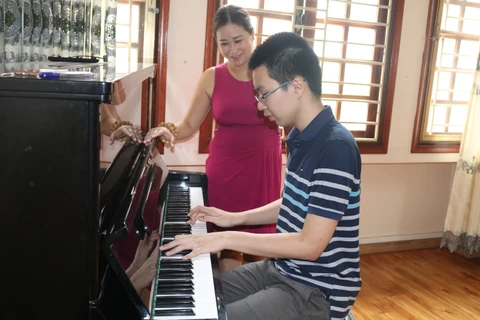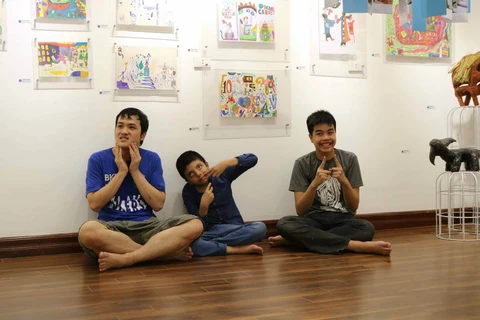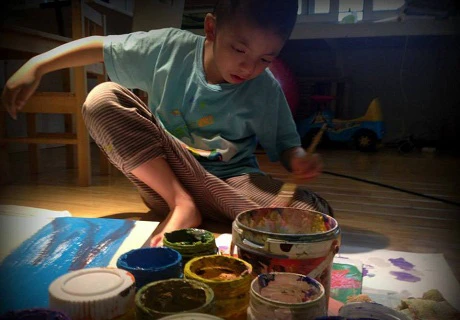 Nguyen Khoi Nguyen holds a bottle on his head while riding a unicycle and juggling eight balls at Tam Viet Centre (Source: VNA)
Nguyen Khoi Nguyen holds a bottle on his head while riding a unicycle and juggling eight balls at Tam Viet Centre (Source: VNA) Hanoi (VNA) - “I want to become the world’s number-one ball-juggling artist,” a Hanoian handsome and agile teenager told the Vietnam News Agency while practicing circus stunts.
Nguyen Khoi Nguyen, now 17, was diagnosed with the West syndrome at six months old and an autism spectrum disorder (ASD) at three.
“My son used to fall into seizures and doctors said he would have to take medications his whole life,” Nguyen The Hiep, Nguyen’s father told Vietnam News Agency.
West syndrome, also known as infantile spasm, is a very uncommon epileptic seizure disease. There is no cure for it. The only treatment is to reduce symptoms.
Hiep and his wife went to different hospitals to seek answers to their son’s situation and the doctors all said the same thing.
Also living with autism, a developmental disorder characterised by trouble with social interaction and communication, Nguyen had a very poor awareness of his surroundings.
The anti-epileptic drugs help stop the seizures, but it also makes him less interested in what is happening around him.”
Refusing to let his son depend totally on drugs and struggle against the syndrome alone, Hiep took Nguyen to as many schools as possible.
However, the epileptic child was usually sent away from those schools after a short period. He was too active to attend classes.
“Teachers said sorry for not being able to keep him in classes while classmates refused to socialise with him because he was different,” Hiep, now 60, recalled.
The father took his son home again and again.
As Nguyen grew, his condition got worse, though his seizures became less frequent. He grew tall, but clumsy, unable to control his actions.
“Nguyen either ran all around or stayed in a corner biting his fingers till they bled,” Hiep said, almost bursting into tears when recalling his son’s childhood.
This 12-year journey of struggle did not pass quickly for the family.
A miracle comes
Hiep never missed a chance to help his son interact with others, but he kept failing until one day in 2013, when an expert he met praised his son’s ability rather than calling him weird like many others did.
“Nothing is wrong with your son. The boy has exceptional senses and skills with his body, particularly the hands,” Hiep quoted PhD. Phan Quoc Viet as saying when he saw Nguyen playing with balls and stuff at his centre.
“Viet termed my son’s condition as ‘Bodily-kinesthetic’ (body smart),” the father elaborated.
PhD. Phan Quoc Viet is the co-founder of the Hanoi-based Tam Viet Center, a clinic treating autistic people using circus stunts, where Hiep took his son to.
Nguyen, and many other youngsters, with the condition and without proper treatment, would have hard time controlling their emotions and actions, like screaming and harming themselves and even others.
“For these children, trying to calm them down would never work. It’s better to develop the ability they have,” Viet explained.
“The idea is to get them outdoors and let them do what they are good at and make them active physically,” he told Vietnam News Agency.
Via practicing circus stunts and with discipline, children with autism like Nguyen have developed attention and patience.
Nguyen is now fascinated with circus stunts.
He has shone on big stages with his mesmerising performances amid the love and pride of his family and teachers and the admiration of audiences.
“Nguyen can do a combination of several stunts, which few Vietnamese professional circus artists can,” Viet affirmed.
For Mai Kim Phuong, Nguyen’s mother, it was a miracle to see her son able to control his feelings and actions, not to mention to setting the national record.
“Viet gave birth to my son for the second time,” Phuong said.
Phuong quit her PR job to pursue a special education major at the Hanoi National University of Education in her thirties, hoping to better support her son.
“My son was born perfect just like other babies. There is no way he is a waste-product,” Phuong said.
Nguyen’s parents said they would do whatever they could to help their son improve.
A source of inspiration
Phuong, who is now in her forties, holding a master degree in the major, set up a special education centre in Hanoi in 2012, and named it Khoi Nguyen Special Education Centre.
The second Khoi Nguyen Special Education Centre was founded in the central city of Hue five years later.
The two facilities provide services to about 60 children born with the same condition as Nguyen’s. Sometimes, Nguyen joins his mother to teach and play with her students at classes.
Nguyen sometimes helps his mother teach autistic children at her centre (Clip: Phuong Vu)
“For a teenager with West syndrome and autism, Nguyen is doing beyond excellent,” his mother said.
“Nguyen sent me texts, saying how he missed and loved me whenever I was in Hue for business trips,” Phuong said, adding that Nguyen’s improvement gives her determination to help disadvantaged children.
Nguyen’s parents also attributed his achievements to Viet and teachers at Tam Viet Group, who saw the talent in their son and helped him to develop it.
Tam Viet Group has offered social skills training for general people over the past two decades, and also welcomed people with autism.
It is providing non-interference, drug-free treatment and physical training for dozens of autistic people.
“The world faces huge challenges in treating adolescents and adults on the autism spectrum,” Viet said, affirming that Nguyen’s story is internationally unprecedented.
Tam Viet Group has worked with several international educational institutions to introduce its method to the world.
“Nguyen is a living proof of a new approach for international education targeting adults with autism,” Viet underscored.-VNA
























